Insert coin here: Gaming and the Metaverse
Key take-aways
-
Tencent only launched its first video game in 2004, but is by far the world’s largest revenue earner, surpassing better-known brands like Nintendo, Sony and Microsoft.
-
The company has a large international market share outside of China, and continues to grow through new games and expanding paid-for enhancements to existing games.
-
M&G Investments views the company as trading at a very attractive discount to its global peers, adapting well to new regulations and with good growth potential.
This article was first published in the Quarter 1 2022 edition of Consider this. Click here to download the complete edition.
Corner café arcades are long gone, yet the 8-bit video game era inspired many developers, artists, and engineers to create ever-more immersive virtual worlds. Today’s video games are played on multiple platforms (consoles, PC and mobile) reaching young and old, sprouting a well-established and keenly competitive multibillion-dollar industry.
The growth of gaming studios has not gone unnoticed by larger technology firms. One of the world’s largest gaming publishers, Activision Blizzard, is set to be acquired by Microsoft for US$68 billion, a record-breaking amount for the Xbox owner and the gaming industry alike. Fortunately for South African investors, access to the industry’s earnings power comes via the Naspers/Prosus investment in Tencent, the world’s largest video game company as measured by revenue, as seen in Graph 1.
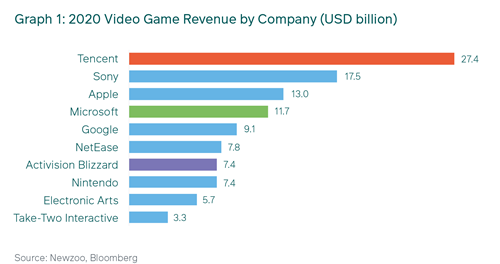
Rapid growth for Tencent
Tencent’s first game only launched in 2004, making its current market position particularly impressive. The game was inspired by Tencent QQ, an instant messaging service, but like many Chinese applications it operates more like a Swiss army knife. The super-app allows rich social interactivity, access to games, movies, music and shopping.
Alongside their own studios, traditionally focussed on Chinese consumers, Tencent also understood the offshore opportunity. Their sought-after portfolio includes: 100% of Riot Games, best known for League of Legends with 100 million monthly active users (MAU); and 40% of Epic Games, best known for Fortnite with 80 million MAU. Epic Games also developed the Unreal Engine, a commercially available gaming engine used widely by gaming studios to create games, specifically modelling in-game animation and physics. Its other notable investments and partnerships include Ubisoft, Activision Blizzard (note above), Roblox Corporation (with north of 150 million MAU) and the fiercely independent Nintendo.
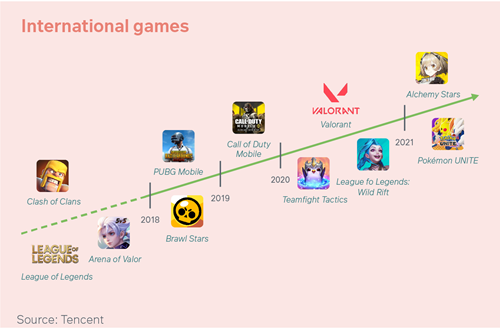
The benefit to Tencent is twofold: first, it helped them develop massively successful Chinese online multiplayer games through adapting global hits to the Chinese gamer. One of these was Honor of Kings, the world’s top-grossing mobile game in 2020, which remains the most popular game in China as measured by active users and downloads. Second, access to these hugely successful game franchises provides geographically diversified and recurring revenue, as players pay to compete online. Graph 2 highlights the rising contribution to company revenue from international games. Investee companies benefit through highly sought-after access to the Chinese consumer, as entry into the market is controlled. Tencent distributed 1 million Nintendo Switch consoles in China during 2020, a boost for Nintendo, but also for Tencent, as they publish their games on new platforms.
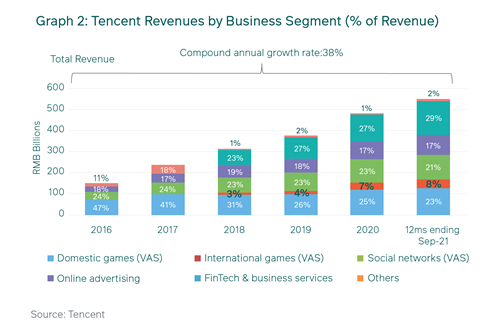
Welcome to the Metaverse
As the physical world locked down, the virtual world thrived, alongside the concept of the Metaverse. Most of our digital interactions today are just in two-dimensions - that is, our sight is locked to an obvious screen. Video conferencing has been surprisingly successful despite this constraint. We cannot lean over to whisper to a colleague and never really make eye contact in online meetings. The Metaverse, meanwhile, represents the bridging of this gap, by adding another dimension of interaction. For example: virtual spaces are created through immersive headsets with wide viewing angles, 3D sound allows us to differentiate and triangulate sounds and haptic gloves permit a virtual handshake. Such worlds create new opportunities for trade. Although today’s technology requires further development, some video games have already created thriving digital economies.
Fortnite, best known as a “battle royale” game, has generated live concerts virtually. They hosted the popstar Ariana Grande last year, merging the game’s traditional gameplay with a concert experience. Players competed in mini games, watched the concert, and danced together in digitally designed and specially purchased outfits. Yes, standing out from the crowd is important, and Balenciaga will happily sell you a digital luxury outfit. Although hard to envisage, the experience certainly resonated with consumers as the concert drew 78 million people!
This growing social element of video games plays into Tencent’s strength in social networking, and its importance is emphasised as Games and Social Networks forms part of Tencent’s Value Added Services (VAS) division. Strong and growing video game franchises are often based on highly captivating stories, filling content pipelines across other forms of media and vice-versa, as seen with books adapted for the big screen. Tencent applications link seamlessly to other media forms. Collectively the division enjoys a very large and active user base that can be tapped for new launches. Gamers and spectators alike love streaming video game content, as evidenced in the rise of E-sports, which is already estimated to be a one-billion-dollar industry. Gaming companies benefit from selling tickets, merchandise, media rights and of course drawing in more players. Furthermore, Tencent’s Online Advertising business benefits as third-parties increasingly market products and services digitally, and are drawn to successful platforms.
Coping with new regulation
No business runs without risk: recently Tencent investors had to deal with increased regulatory scrutiny from the Chinese Communist Party (CCP). Oversight on CCP-appropriate content has been intensifying since 2017, slowing the approval of new game licenses and monetisation features. More recently the CCP focussed on minors’ excessive screen time, a widely shared concern, with Tencent swiftly adhering to the new government regulations. By September 2021, minors accounted for only 0.7% of the total time spent playing Chinese games. Graph 2 points to the impact of the new regulations on the company’s domestic gaming revenue growth, which was down 0.6% during 2018, followed by a resumption of growth to 10.1% per annum to September 2021. Plus, total revenue was bolstered by international diversification over the period. Tencent also fostered solidarity with the CCP by devoting aspects of some of its games to Chinese culture, “bringing it to life” with digital player skins or outfits based on Chinese art and tradition. All considered, the group’s focus on better quality games, and a backlog of games set for approval, has filled a healthy revenue pipeline.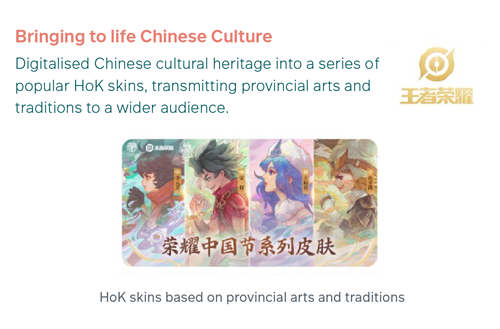
An unreasonable discount
M&G Investments has long appreciated Tencent’s excellent growth, high margins and strong cash generation, as well as the attractive access via Naspers/Prosus shares. The latter companies benefit from its robust earnings contribution and a growing dividend stream that assist in funding their other global E-commerce investments. Graph 3 highlights the value on offer: Naspers is trading on the most attractive valuation, with a price-to-earnings measure of under 10X, compared to US internet companies at an average of around 30X and global video gaming companies at 25X. Tencent itself is also trading at what we believe to be an unreasonable discount to other global video gaming and US internet stocks.
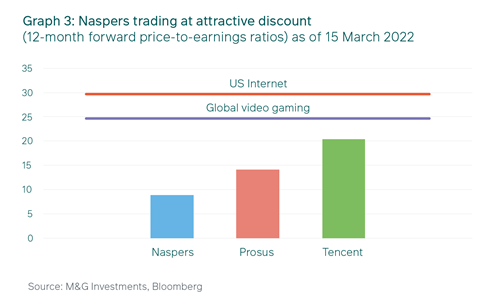
As the world returns to public spaces, many anticipate less time for screens, but since 2007 the world has increasingly embraced the computer that fits in your pocket and the digital interaction it allows. This is a screen Tencent has mastered, having created a digital world used daily by many millions of Chinese locals that connects them to each other, to their favourite content, and not least of all, to many different services. Tencent Gaming continues its focus on enriching the gaming experience with available-to-purchase expansion packs and player skins. These elements are less capital intensive for the company, produce incrementally stronger cash flows and are likely to keep many more gamers active on their platforms for longer.
Appendix
- https://www.tencent.com/attachments/toolkit/2021/Q3/CorporateOverview3Q21.pdf
- https://www.tencent.com/attachments/toolkit/2021/Q3/3Q21EarningsPresentation.pdf
Share
Did you enjoy this article?
 South Africa
South Africa Namibia
Namibia




 Get the Newsletter
Get the Newsletter